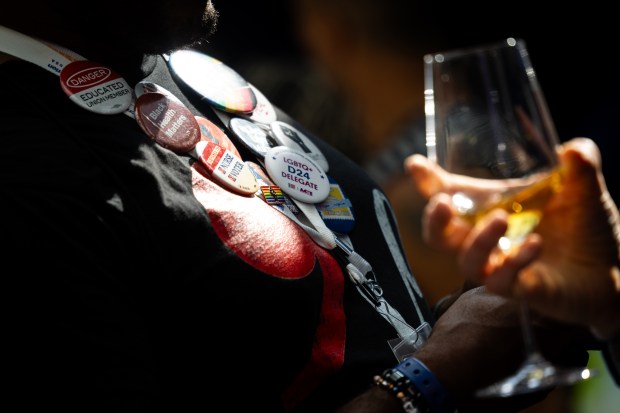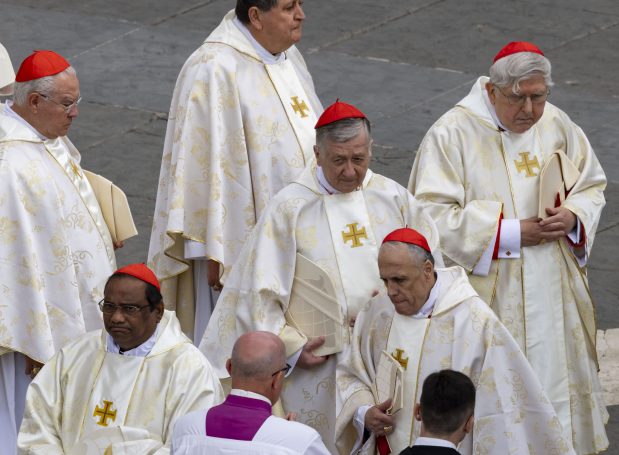Julie Johnson, a state representative and candidate for a U.S. congressional seat in Texas, has been attending Democratic National Conventions since 2000. This year, she’s also one of more than 800 LGBTQ+ delegates representing the Democratic Party, according to convention officials.
Johnson said it is important for voters to see representatives like her: LGBTQ+ officials in historically Republican states where it is more challenging for a Democrat to win an election, and “where the gains need to be made if we are ever going to achieve our full equality.”
“To see the rapid increase of participation and elected people in the LGBTQ community is just so satisfying and wonderful,” said Johnson, who is one of the founders of the Texas legislature’s LGBTQ caucus.
But, Johnson said, “the stakes have never been higher” for an election.
Johnson gathered with other LGBTQ+ delegates, Democratic Party officials, celebrity guests and allies at a rooftop bar in downtown Chicago on Tuesday afternoon to celebrate the record-breaking numbers of LGBTQ+ representatives in public office and at this year’s Democratic National Convention.
The event boasted more than 300 attendees and was full of energy, excitement and stickers that read “Don’t get mad, get elected,” but there was an acute sense of awareness among LGBTQ+ leaders of the high stakes of this year’s election for the LGBTQ+ community as they say they are facing increasing threats to their rights from Republicans.
U.S. Transportation Secretary Pete Buttigieg, the first openly gay Cabinet official, headlined the event, along with actors Wilson Cruz and Zachary Quinto and comedian Dana Goldberg. Among the crowd were LGBTQ+ political bigwigs such as former Chicago Mayor Lori Lightfoot, Govs. Tina Kotek of Oregon and Jared Polis of Colorado, and Danica Roem, the first transgender state senator in Virginia and the South.
Buttigieg shared his gratitude to those who came before whose “activism and advocacy” allowed him to achieve life goals. He spoke of his family and of the outstanding issues the LGBTQ+ community faces, such as preserving the right to marriage equality for same-sex couples and protecting Black trans women from violence. And he shared what Vice President Kamala Harris and Minnesota Gov. Tim Walz, the Democratic nominees for president and vice president, stand for.
“We know what we are up against, but the most important thing is what we are for,” Buttigieg said, nodding to this year’s election. “Freedom.”
Increased LGBTQ+ representation
Convention officials said that of the 81% of delegates who responded to a survey, 17% identified themselves as LGBTQ+. In 2020, only 11.5% of delegate respondents identified as LGBTQ+.
Sam Alleman, the national LGBTQ+ engagement director for the Harris-Walz campaign, posted Monday on X, the platform formerly known as Twitter, reporting that there are more than 50 transgender and nonbinary delegates, another record-breaking number.
LGBTQ+ Victory Institute, a nonpartisan organization dedicated to electing members of the LGBTQ+ community into public office, hosted Tuesday’s event. Annise Parker, the group’s president and CEO, said there has been a strong presence of LGBTQ+ delegates at DNCs for a few decades, but more recently, the “willingness (of delegates) to self-identify has really been transformative.”
“Up-and-coming candidates from across the country are present and visible,” said Parker, who was the first openly LGBTQ+ mayor of a major U.S. city when she was elected in Houston. “They need to see us, we need to see them, and we need to have substantive conversations with them, reminding them about the fact that we are still not full citizens here in the United States and that we need their help.”
Davante Lewis, a four-time LGBTQ+ delegate from Louisiana who serves as one of the state’s public service commissioners, said the increased representation shows an “amazing commitment to the diversity” of the Democratic Party.
Between June 2023 and May 2024, the number of LGBTQ+ elected officials increased by 10%, according to LGBTQ+ Victory Institute. Representation has jumped over 190% since the organization began reporting the data in 2017, but LGBTQ+ officials still only represent 0.25% of all elected positions in the U.S. The Victory Institute reports that more than 38,000 LGBTQ+ people would need to be elected to achieve equitable representation in government.
Veronica Pejril won a city council seat in Greencastle, Indiana, in 2019 and said she was the first openly transgender elected official in the state. Now, the Chicago native turned Hoosier is a DNC delegate and running for state Senate.
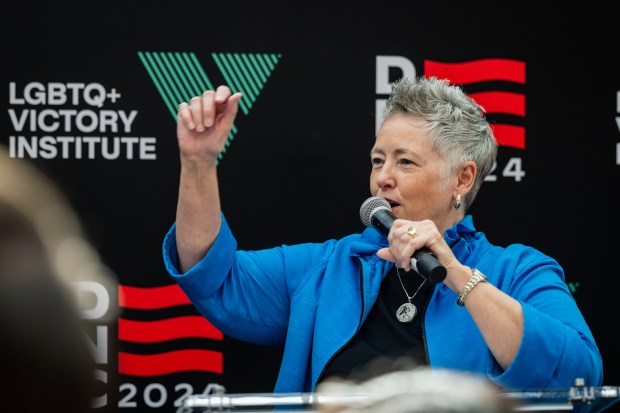
“Being part of the rainbow family and representing queer folks in a way that’s visible is so important,” Pejril said. “Especially (so) our young people can see … and know that they can achieve things in their lives too.”
As of Aug. 21, there are 1,305 LGBTQ+ elected officials nationally, with 62 in Illinois, the third-largest cohort among the 50 states, Washington, D.C., and U.S. territories, according to the Victory Institute. The overwhelming majority of these officials identify as Democrats.
One of those Illinois officials is state Rep. Kelly Cassidy, a Democrat from Chicago and the only openly lesbian member of the Illinois General Assembly. While Cassidy is not a delegate this year, she attended the 1996 DNC in Chicago as one of only three openly LGBTQ+ Illinois delegates and around 400 total, she said.
Cassidy called the 1996 experience “exhilarating” and said it gave her the “permanent bug” for politics. This year, she chose to sit out as a delegate and feels reassured in her decision due to all the new and old LGBTQ+ representatives, she said.
“Having spent my entire adult life organizing and growing the … electoral and political power of this community, it is a little breathtaking to look around,” Cassidy said. “My decision to not be a delegate this year is affirmed by how many people this is a first-time experience for and how exhilarated they are and seeing that same look in their face as I had on mine in ’96.”
2024 election stakes
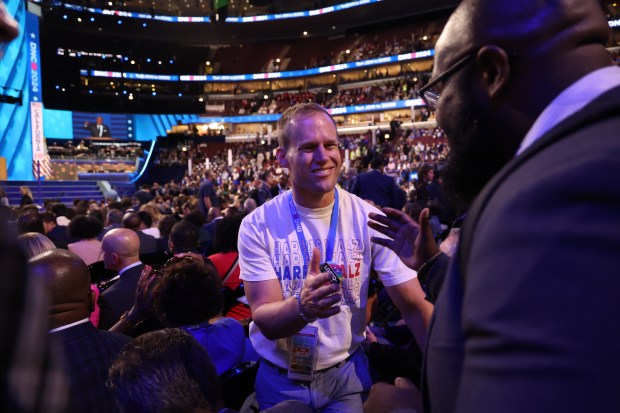
The 1996 Democratic convention in Chicago came as the LGBTQ+ community continued to battle the HIV/AIDS epidemic and the Defense of Marriage Act, a law former President Bill Clinton had agreed to sign that would deny federal recognition of same-sex marriage and define marriage as between a man and a woman.
For this year’s convention, LGBTQ+ Democrats are riding the wave of increased national representation and support from President Joe Biden’s administration and hoping for a Harris presidency, while they say they are also fighting to secure their rights in red states. Many of the delegates and party officials told the Tribune they are motivated, inspired and ready to vote this fall, seeing the Republican alternatives as threats to their lives and their communities.
Some of these threats are the anti-transgender bills winding their way through state legislatures, the rhetoric from conservative-leaning U.S. Supreme Court justices surrounding same-sex marriage and bodily autonomy and Project 2025, the plan authored by conservative leaders for the next Republican president, they said.
Parker, who spoke at Tuesday’s event about the record-breaking year for representation and for attacks against the LGBTQ+ community, said she hopes Democratic party officials leave the convention this year with the same “energy and excitement” that they came with.
“Then we have to go back out there and do the work to make sure that the right people get elected,” Parker said.
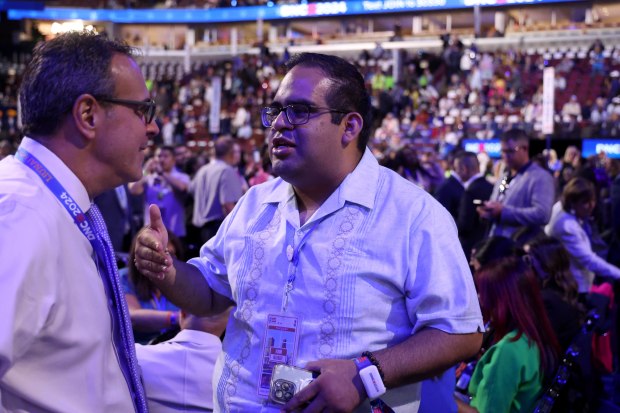
Lake County Clerk Anthony Vega, a first-time delegate, said the increased representation of LGBTQ+ people like himself means the community is being seen and recognized. But that progress might be stymied if Harris loses the election in the fall, he said.
“If (former President) Donald Trump is elected, we’re going to see a rise in anti-LGBTQ officials and bills that are anti-trans that are being pushed across the state,” Vega said. “The fall of Roe v. Ward wasn’t just about reproductive choice. It was the beginning of rolling back all the rights, including same-sex marriage, that we have fought very hard for.”
Ald. Timmy Knudsen, a first-time delegate who represents Chicago’s 43rd Ward on the North Side, agreed with Vega.
“We have two candidates that view our rights and freedoms quite differently,” Knudsen said. “This campaign is about getting Kamala Harris elected, but it truly (is about) securing our freedoms. And as a gay man, I am concerned with what a judiciary under another Trump presidency would turn into and how that would impact our rights.”
Cassidy did not mince words when it came to discussing the stakes this November.
“It is a life or death election for us,” she said.


